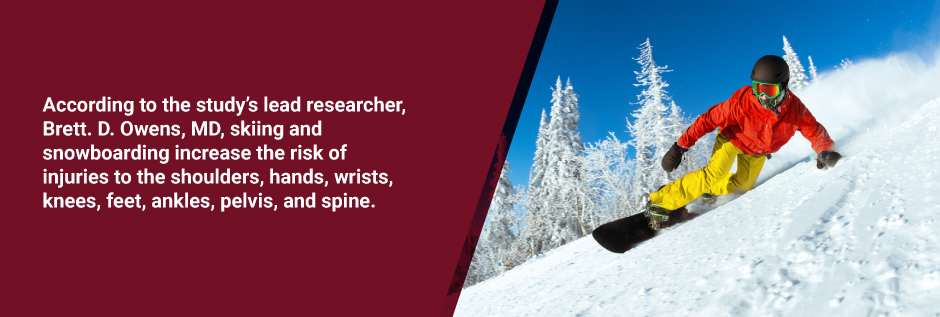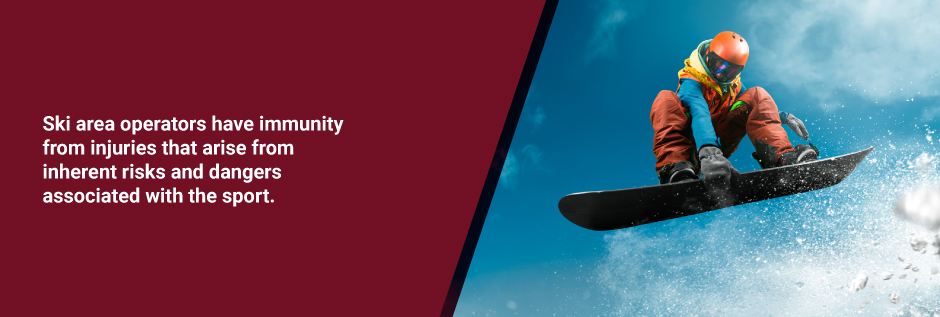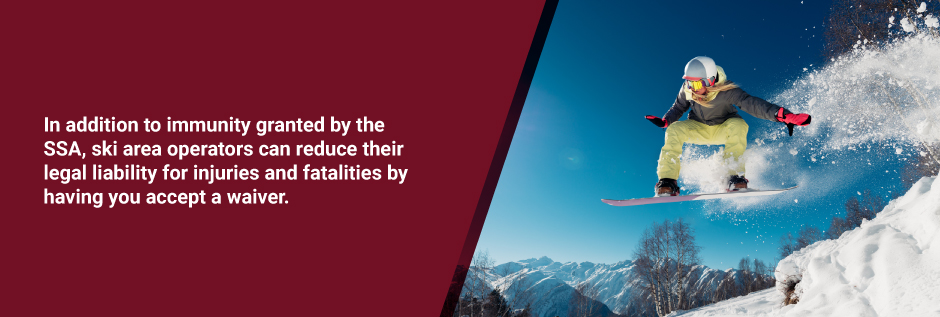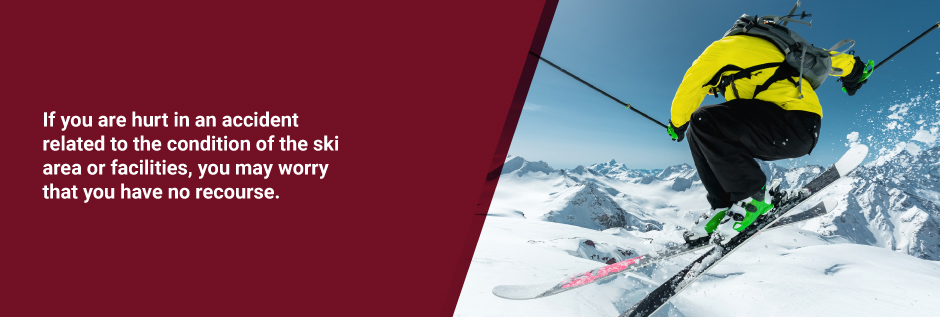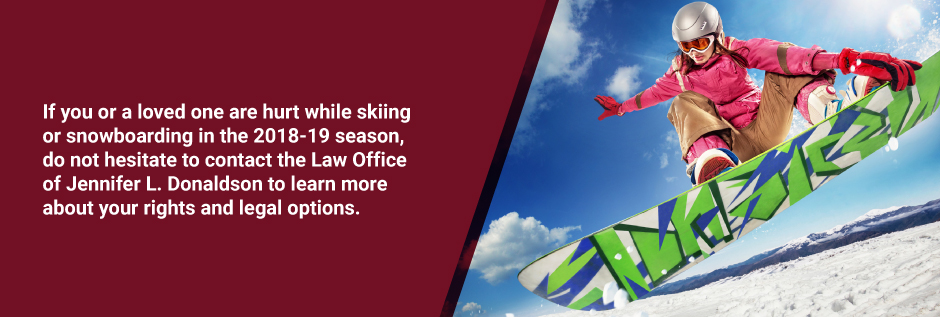Colorado Ski Safety Act
Table of Contents
ToggleColorado is a popular destination for skiing, snowboarding, and other winter sports. Unfortunately, these winter activities can be dangerous. In the 2016-17 season, the National Ski Areas Association (NSAA) reported 33 catastrophic injuries for skiers and snowboarders and 44 fatalities.
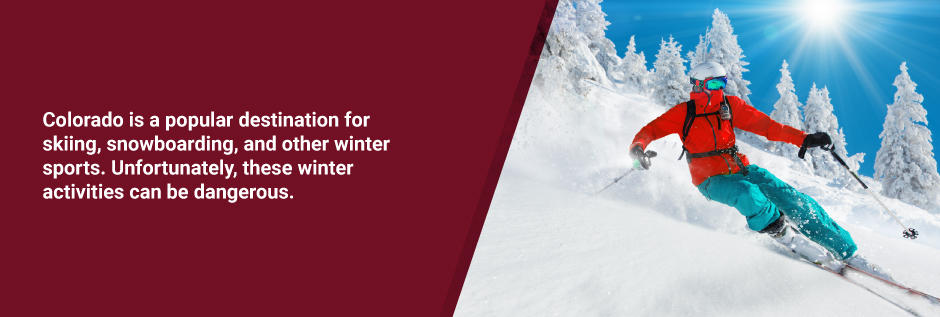
The NSAA only records life-altering head injuries, broken backs and necks, and paralysis. Many skiers and snowboarders suffer serious injuries that are not recorded as catastrophic injuries by the NSAA.
Snowboarders are, particularly at risk. A study performed by researchers at the Warren Alpert Medical School of Brown University found snowboarders are three times more likely to be injured than skiers.
Given that Colorado has the fourth most operating ski area in the U.S., it is safe to assume serious injuries, catastrophic injuries, and fatalities occur here each year. If you plan on hitting the slopes in Colorado this winter, take the time to familiarize yourself with the best safety practices. Also, get to know Colorado’s Ski Safety Act (the Act or SSA).
Common Skier and Snowboarder Injuries
According to the Warren Alpert study’s lead researcher, Brett. D. Owens, MD, skiing, and snowboarding increase the risk of injuries to the shoulders, hands, wrists, knees, feet, ankles, pelvis, and spine. In other words, your limbs are most at risk while participating in these winter sports, although you can also experience serious injuries to your abdomen and back.
Skiers are more likely to experience injuries in their lower extremities. Knee injuries due to twisting motions are very common. Snowboarders are more likely to hurt their upper extremities when they fall on their hands.
Ski Area Operator’s Liability Under the Act
If you or a loved one are injured while skiing or snowboarding because of a condition on the slopes or the ski area’s facilities, you should talk with a lawyer right away about a ski area operator’s liability for injuries – or lack of liability. Ski area operators have immunity from injuries that arise from inherent risks and dangers associated with the sport.
Risks and Hazards under the Colorado Ski Act
Under the Act, there are seven categories of risks and hazards:
- The failure of a skier to ski within the bounds of their own abilities.
- Collisions between skiers.
- Variations in steepness or terrain in the ski area, such as roads, freestyle terrain, jumps, and catwalks.
- Impacts with natural or man-made objects that skiers commonly encounter on the slopes, including signs, lift towers, fences, posts, enclosures, hydrants, or water pipes.
- Surface or subsurface conditions in the ski area, such as bare spots, trees, stumps, streambeds, cliffs, and other natural objects.
- Changing snow conditions, including hardpack, powder, packed powder, wind pack, slush, and ice.
- Changing weather conditions.
In other words, there are many things that can cause or contribute to a skiing or snowboarding accident that is considered inherent to the sport and which means the ski area operator may not be liable for your injuries.
Ski Resort, Lift, and Lesson Waivers
In addition to the immunity granted by the SSA, ski area operators can reduce their legal liability for injuries and fatalities by having you accept a waiver. When you purchase your entrance into a resort or ski area, when you use a lift ticket, or when you sign up for ski or snowboarding lessons, you often have to sign a document that waives the business’s liability for injuries.
You may not even have to sign anything to be bound by these waivers. Simply by accepting a ticket or lessons, you implicitly acknowledge the waiver, which may be printed in small print on the back of your ticket.
This can be a tough pill to swallow. The 10th Circuit Court of Appeals in Denver found that these waivers are valid. If you accept a ticket with a waiver on the back, or if you sign a waiver, you are releasing the business from liability if you are hurt on the mountain.
Ski Area Operators Are Not Entirely Immune
If you are hurt in an accident related to the condition of the ski area or facilities, you may worry that you have no recourse. However, this is not necessarily true. If you can prove a ski operator’s negligence, recklessness, or intentional misconduct, you may be able to obtain compensation.
If you file a lawsuit against a ski area operator within two years of the date you sustained your injuries, and you succeed in proving the operator’s negligence, gross negligence, or misconduct, then you may receive compensation. However, Colorado law caps the amount you can receive. Under the Act, you can obtain up to $1 million.
Duties of Skiers
Although the ski area operator may not be legally liable for your injuries, you may still have recourse. If, for example, another skier or snowboarder causes a collision on the slopes which causes injury, that person may be held liable for any injuries caused.
The SSA clearly delineates the duties of skiers, including knowing their own abilities and maintaining control on the slopes. If a skier causes a collision, he or she is required to provide their name and contact information to the ski area operator or ski patrol prior to leaving the scene.
Do Not Hesitate to Talk to a Denver Personal Injury Lawyer
After a skiing or snowboarding accident, it is important to speak with an experienced personal injury lawyer in Denver. An attorney can investigate whether a dangerous condition existed in the ski area or facility or whether the ski area operator was negligent. Then, your lawyer will explain your legal options, including the likelihood of succeeding in a claim against a ski area operator.
If you or a loved one are hurt while skiing or snowboarding in the 2018-19 season, do not hesitate to contact Donaldson Law, LLC at (303) 458-5000 to learn more about your rights and legal options.

